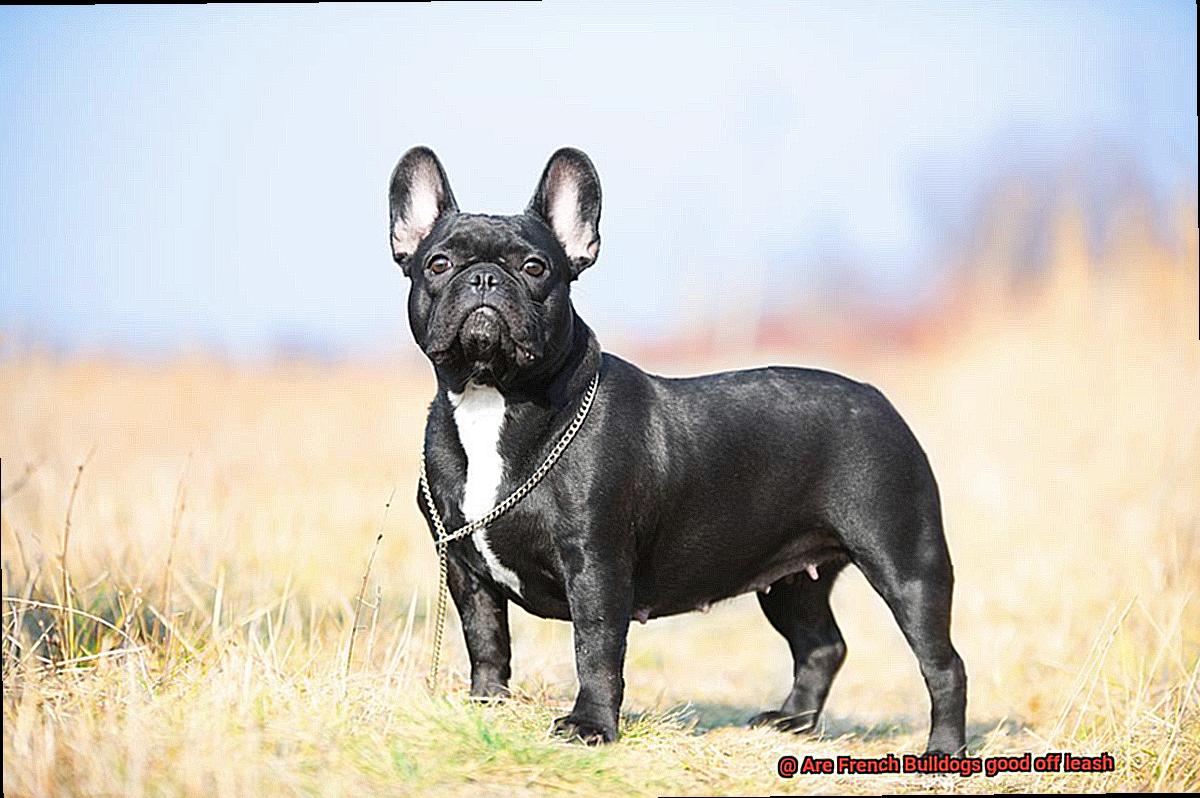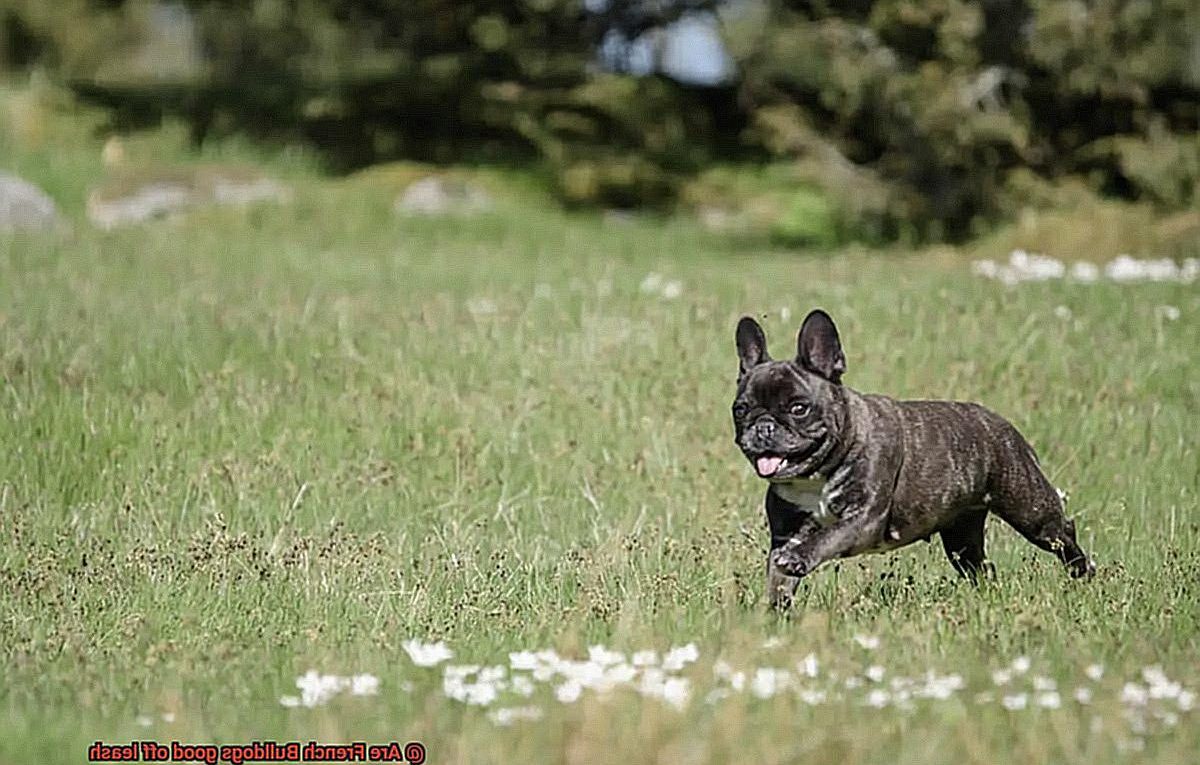Are French Bulldogs good off leash?
Are you a proud French Bulldog owner?
Do you dream of watching your little fur baby run wild and free, without the pesky leash holding them back? Well, you’re not alone.
French Bulldogs are famous for their adorable looks and spunky personalities, which might make you wonder if they can handle life off-leash. But before you go unclipping that leash, let’s take a moment to weigh the pros and cons.
So grab a cup of joe, sit back, and let’s embark on this off-leash adventure with your French Bulldog.
The Prey Drive of French Bulldogs: Why They Might Not Be Good Off Leash
Contents
- 1 The Prey Drive of French Bulldogs: Why They Might Not Be Good Off Leash
- 2 Brachycephalic Dogs: Are Frenchies at Risk of Overheating?
- 3 Training and Socialization: Can It Help Improve Recall Skills?
- 4 Fenced-In Areas: Is an Enclosed Space Safer for Your Frenchie?
- 5 Supervision is Key: How to Monitor Your Dog When Off Leash
- 6 Weather Conditions to Consider Before Taking Your Frenchie Off Leash
- 7 Individual Temperament and Training: What Factors Should You Consider?
- 8 Alternatives to Letting Your Frenchie Off Leash
- 9 Conclusion
French Bulldogs are beloved pets known for their affectionate nature and adorable appearance. However, when it comes to off-leash activities, their strong prey drive and other factors make them less suitable for this type of freedom. In this article, we will explore why French Bulldogs may struggle with off-leash activities and provide alternative ways to meet their exercise and mental stimulation needs.
Prey Drive and Ancestry:
French Bulldogs have a strong prey drive due to their ancestry as ratting dogs. This instinctual behavior can override their obedience training when they encounter something that triggers their instinct to chase and capture prey.
Easy Distraction:
French Bulldogs are easily distracted by movement or enticing scents. Their keen senses and curiosity make them susceptible to chasing after anything that catches their attention, which can lead to them running off or not responding to recall commands.
Moderate Energy Level:
Although French Bulldogs enjoy short bursts of play and exercise, they may quickly tire out during prolonged physical activities. Their moderate energy level means they may not have the endurance required for extensive off-leash activities.
Brachycephalic Breathing Difficulties:
French Bulldogs have short noses and flat faces, leading to breathing difficulties and overheating during exertion. This anatomical feature makes them more susceptible to heatstroke and respiratory distress when engaging in intense physical activity off leash.
Alternatives to Off-Leash Activities:
To ensure the safety of French Bulldogs and others, it is recommended to provide alternative forms of exercise and mental stimulation:
- Structured Walks: Regular walks on a leash allow for controlled exercise while providing mental stimulation through new sights, sounds, and smells.
- Obedience Training: Engaging in obedience training sessions helps stimulate a French Bulldog’s mind while reinforcing good behavior and responsiveness to commands.
- Puzzle Toys: Interactive puzzle toys can keep French Bulldogs mentally engaged and entertained, providing a challenge that satisfies their need for mental stimulation.
- Interactive Games: Engaging in interactive games such as hide-and-seek or fetch in a secure, enclosed area can provide physical exercise while ensuring their safety.

French Bulldogs’ strong prey drive, easy distraction, moderate energy level, and brachycephalic breathing difficulties make them less suitable for off-leash activities. Understanding and respecting their instincts and limitations is essential for their safety and well-being. By providing alternative forms of exercise and mental stimulation, owners can meet their French Bulldog’s needs while ensuring their safety in various environments. Remember to always supervise your pet closely and prioritize their health and happiness when considering off-leash activities.
Brachycephalic Dogs: Are Frenchies at Risk of Overheating?
We all know how lovable and unique these little furry friends are. But did you know that their cute flat faces and shortened muzzles can make them more prone to overheating? That’s right. In this article, we’ll delve into why French Bulldogs are more likely to overheat compared to other breeds and provide you with some essential tips to keep your Frenchie cool and comfortable.
Understanding Brachycephalic Anatomy:
French Bulldogs belong to the brachycephalic breed group, which includes dogs with short noses and flat faces. This adorable feature comes with some challenges when it comes to regulating body temperature. Their unique skull shape makes it difficult for them to pant effectively, which is the primary way dogs cool down. As a result, Frenchies may struggle more than other breeds in hot and humid weather.
Increased Vulnerability in Hot Weather:
Here’s the thing: French Bulldogs have a lower tolerance for heat and exercise compared to their longer-muzzled counterparts. Their brachycephalic anatomy further hampers their ability to breathe efficiently, making them even more susceptible to overheating. So, it’s important for French Bulldog owners to be extra cautious during warm weather.
Preventing Overheating:
To ensure your Frenchie stays safe and comfortable, take note of these essential tips:
- Provide Ample Shade and Fresh Water: Create shady spots in your yard or use outdoor umbrellas to give your Frenchie a cool place to relax. Always make sure they have access to fresh water throughout the day.
- Avoid Strenuous Exercise During Hot Weather: While it’s important for your Frenchie to stay active, avoid intense exercise during hot hours. Opt for shorter walks or play sessions in cooler parts of the day.
- Never Leave Them in a Parked Car: We can’t stress this enough – never leave your Frenchie unattended in a parked car, even for a few minutes. The temperature inside a car can rise rapidly and become life-threatening for your furry friend.
Recognizing Signs of Overheating:
Knowing the signs of overheating in your Frenchie is crucial. Keep an eye out for excessive panting, drooling, lethargy, or collapsing. If you observe any of these symptoms, take immediate steps to cool them down.
Emergency Cooling Measures:
If your Frenchie shows signs of overheating, try the following steps:
Move them to a cooler area: Bring your Frenchie indoors or find a shady spot with good airflow.
Offer water: Encourage your Frenchie to drink small amounts of cool (not cold) water.

Training and Socialization: Can It Help Improve Recall Skills?
The French Bulldog – a breed known for its charm, loyalty, and those oh-so-cute bat-like ears. But let’s be honest, sometimes they can be a little stubborn when it comes to coming when called. Don’t worry, though. With the right training and socialization, you can help improve your French Bulldog’s recall skills and have them running back to you in no time.
Start Early and Be Consistent
Just like with any other breed, training is essential for teaching a French Bulldog to come when called. But here’s the scoop – consistency is key. Start training your Frenchie from a young age and make sure to practice the recall command regularly. Use positive reinforcement techniques, like treats or toys, as rewards when they respond to the command. Trust me, they’ll be wagging their little tails with joy.
Get Socializing
Now, let’s talk about socialization. This is a biggie when it comes to improving recall skills. By exposing your French Bulldog to different people, animals, and environments, they become more comfortable and less distracted when off leash. Take them on walks in the park, introduce them to other furry friends, and let them explore new places. The more they experience, the better their recall skills will be.
Take It Slow
Remember, Rome wasn’t built in a day and neither are perfect recall skills. Start training in a controlled and familiar environment before gradually introducing distractions and new locations. This helps build your Frenchie’s confidence and responsiveness. And hey, don’t forget to use a long line or leash during training to provide some security while still giving them some freedom to sniff around.
Positive Reinforcement is Key
When your French Bulldog does come when called, make sure to shower them with praise, treats, or playtime. Positive reinforcement is like magic to their little ears. It reinforces the behavior and makes them more likely to come when called in the future. So go ahead, be their biggest cheerleader.
Remember, Each Frenchie is Unique
Lastly, it’s important to keep in mind that each French Bulldog is unique. Some may naturally have better recall abilities than others, while some may require more time and effort in their training. So be patient, stay consistent, and keep those training sessions fun and engaging.
Fenced-In Areas: Is an Enclosed Space Safer for Your Frenchie?

When it comes to the safety of our furry friends, having a fenced-in area can be a game-changer. Let’s dive into the pros and cons of having an enclosed space for your French Bulldog and see if it’s the right choice for you and your pup.
Pros of Having a Fenced-In Area:
- Security and Peace of Mind: A fenced-in area provides a sense of security, knowing that your Frenchie can roam freely without the risk of running off or getting lost. It allows them to enjoy some off-leash time while you relax knowing they are safe within the boundaries.
- Prevention of Escapes: French Bulldogs have a strong prey drive, which means they might be tempted to chase after small animals or objects if given the chance. Having a fence in place prevents them from wandering off and potentially encountering dangerous situations.
- Physical Exercise and Exploration: With a fenced-in area, your Frenchie can stretch their little legs, explore their surroundings, and get some much-needed exercise. It gives them the freedom to play and sniff around without the constant worry of them darting away.
- Containment for Training: A fenced-in area is an excellent space for training sessions. You can work on recall, obedience, and other commands without worrying about distractions or your Frenchie running off.
Cons of Having a Fenced-In Area:
- Supervision is Still Necessary: While a fence provides an extra layer of safety, it doesn’t mean you can let your guard down completely. French Bulldogs are known for their curiosity and ingenuity, so even within a fenced-in area, they may find ways to escape if left unsupervised for long periods.
- Regular Maintenance: Fences should be regularly inspected for damages or weak spots that may need repair. French Bulldogs are notorious escape artists, so ensuring the fence is tall enough to prevent them from jumping over and secure enough to prevent digging or squeezing through any gaps is crucial.
- Mental Stimulation: While a fenced-in area allows for physical exercise, it’s essential to provide mental stimulation as well. French Bulldogs are intelligent dogs that thrive on mental challenges. Consider adding toys, obstacles, or creating a designated play area within the enclosed space to keep them entertained and prevent boredom.
Supervision is Key: How to Monitor Your Dog When Off Leash
You’ve got a French Bulldog who loves to explore and roam freely. You want to give them the freedom they crave, but you also want to keep them safe. That’s where supervision comes in. In this post, we’ll discuss some techniques for monitoring your French Bulldog when they’re off leash, ensuring their safety and your peace of mind.
- Long Lines and Retractable Leashes: These handy tools allow your Frenchie to have some freedom while still keeping them under control. Attach a long line or a retractable leash to their collar or harness, giving them room to explore while preventing them from wandering too far away. This way, you can quickly grab the leash if needed and keep them close in potentially dangerous situations.
- GPS Tracking Devices: If your Frenchie tends to wander or if you’re in an unfamiliar area, a GPS tracking device can be a lifesaver. These devices attach to your dog’s collar and allow you to track their location in real-time through a smartphone app. You’ll always know where your furry friend is, giving you peace of mind during off-leash adventures.
- Training and Recall: Training your French Bulldog to respond to commands like “come” or “stay” is essential for off-leash supervision. Practice these commands regularly in a controlled environment before allowing them off leash in an open space. Consistently reinforce these commands and reward your Frenchie for obeying them, ensuring they’ll come back when called.
- Be Aware of Your Surroundings: When supervising your Frenchie off leash, it’s crucial to keep an eye on your surroundings. Look out for potential dangers like traffic, other dogs, or hazardous substances. Always be prepared to intervene if necessary and protect your dog from harm.
- Choose Safe Environments: Consider where you’re allowing your French Bulldog off leash. Opt for safe and secure areas like fenced-in parks or designated off-leash spaces. Avoid busy or crowded places that can overwhelm or distract your Frenchie.

Weather Conditions to Consider Before Taking Your Frenchie Off Leash
We all know how much our furry friends love the great outdoors, but before you unclip that leash, it’s crucial to consider the weather conditions. As an expert in French Bulldogs, I’m here to share some insights on why weather matters and how it can impact your Frenchie’s well-being.
Hot Weather: Keep Your Frenchie Cool as a Cucumber
Frenchies are notorious for their adorable squished faces, but unfortunately, this makes them more prone to overheating. Extreme heat and high humidity can be dangerous for our four-legged friends. So, avoid taking your Frenchie off leash during the hottest parts of the day. Opt for early morning or late evening walks when the temperature is cooler. And don’t forget to pack some water for both of you.
Cold Weather: Bundle Up, Frenchie.
Winter wonderlands may look beautiful, but they can pose risks for French Bulldogs. With their short coats, these pups need extra protection from the cold. Before letting your Frenchie roam freely in chilly weather, make sure they’re bundled up in a cozy sweater or coat. And remember, short walks are better than long expeditions to avoid exposing them to extreme cold.
Rainy Days: Showers Bring… Wet Frenchies
Rainy weather may not be ideal for outdoor adventures with your Frenchie. Their short coats aren’t very water-resistant, leaving them soaked and uncomfortable. Wet fur can lead to chills and even skin issues. So, if it’s pouring outside, it’s best to reschedule that off-leash outing or provide your Frenchie with a waterproof jacket for added protection.

Unpredictable Weather: Be Prepared for Anything
Mother Nature can be quite unpredictable at times, so always keep an eye on the weather forecast before heading out. Sudden changes like thunderstorms or extreme winds can be distressing for our Frenchies. Make sure they have a safe and secure environment to retreat to if needed, and consider rescheduling your off-leash plans if the weather takes a turn.
Individual Temperament and Training: What Factors Should You Consider?
French Bulldogs are known for their adorable looks and affectionate nature, making them popular companions. But when it comes to off-leash activities, it’s essential to assess their individual temperament and training. In this article, we will explore the factors you should consider before deciding if your Frenchie is suitable for off-leash adventures.
Breed Instincts and Predispositions:
French Bulldogs were bred as companion dogs, meaning they may not possess the same prey drive or instinct to roam as other breeds. However, individual dogs can still exhibit varying levels of these traits. Consider your Frenchie’s natural instincts before venturing off-leash.
Personality and Temperament:
Just like humans, each Frenchie has their own unique personality and temperament. Some may be naturally more obedient and responsive to training, making them better candidates for off-leash activities. Others might be more independent or stubborn, requiring extra patience and consistent training.
Age and Training Level:
Age plays a significant role in a Frenchie’s ability to handle off-leash situations. Younger dogs tend to have more energy and can easily get distracted, making it challenging for them to stay focused off-leash. On the other hand, older dogs with extensive training are generally more reliable in following commands.
Recall Ability:
A strong recall is crucial for off-leash control. Assess your Frenchie’s response when called back by their owner. Dogs with a solid recall are safer to have off-leash as they are more likely to come back promptly. Recall ability can be influenced by training, temperament, and the bond between the dog and their owner.

Environment Suitability:
Consider the environment in which your Frenchie will be off-leash. Fenced-in parks or secure areas provide a safer space compared to open areas with potential hazards or distractions. Assess the surroundings to ensure your Frenchie’s safety during off-leash activities.
Tailored Training:
Training is key in determining whether your Frenchie is ready for off-leash adventures. Consistent and positive reinforcement-based training methods should be employed to teach commands like “come,” “stay,” and “leave it.” Tailor the training to suit your Frenchie’s individual needs and temperament.
Gradual Progression:
Start with off-leash activities in controlled environments, gradually increasing the level of distractions and challenges as your Frenchie becomes more proficient. This approach allows your Frenchie to build confidence and improve their obedience skills over time.
Alternatives to Letting Your Frenchie Off Leash
French Bulldogs are known for their playful and curious nature, but when it comes to venturing off-leash, it’s important to consider their safety and potential risks. In this article, we’ll explore alternatives to letting your Frenchie off leash, ensuring their well-being while still providing opportunities for exercise and exploration.
Long Training Leash:
A long training leash, typically 20-30 feet long, allows your Frenchie more freedom to roam while maintaining control. This is particularly useful in open spaces like parks or beaches where you can supervise them closely.
Secure, Fenced-in Areas:
Designate a secure area in your backyard with a tall fence or take your Frenchie to a designated dog park. These spaces provide a safe environment for your pup to run and play without the risk of them wandering off.
Portable Dog Playpen or Exercise Pen:
Ideal for outdoor activities like picnics or camping trips, portable dog playpens or exercise pens create a contained space for your Frenchie to enjoy some off-leash time safely. They are lightweight and easy to transport.
Training and Obedience Classes:
Enroll your Frenchie in training and obedience classes to reinforce positive behaviors and build trust. These classes focus on recall commands and staying close, reducing the likelihood of your Frenchie running off.
Mental Stimulation Activities:
Engage your Frenchie in mental stimulation activities to redirect their energy and minimize their desire to wander off. Puzzle toys, interactive games, and obedience training exercises keep their minds occupied and focused on you.
GPS Tracking Devices:
For added peace of mind, consider using a GPS tracking device or collar attachment while letting your Frenchie off leash. These devices allow you to track your dog’s location in real-time, ensuring a quick recovery if they wander off.
5EJ4w6AhurM” >
Conclusion
In conclusion, French Bulldogs may not be the best choice for off-leash activities.
While they are known for their friendly and sociable nature, their strong stubborn streak can make it challenging to train them to reliably obey commands when off leash. Their small size and short legs also mean that they may struggle to keep up with larger, more energetic dogs during off-leash play.
It’s important to consider these factors before allowing your French Bulldog off leash in unfamiliar or potentially dangerous environments.




